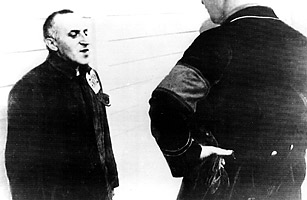
An outspoken pacifist and prominent opponent of Hitler, Carl von Ossietzky was awarded the 1935 Peace Prize for a series of articles exposing Germany's continued breach of the Treaty of Versailles that ended World War I. Having spent the better part of three years in concentration camps, von Ossietzky was battling tuberculosis in hospital under the watch of the Gestapo when his triumph was announced. The writer was strongly advised to decline the honor, but brazenly ignored concerns for his safety and accepted the award. This outraged Hitler, who not only stopped him from attending the ceremony in Oslo but also passed a new law that prohibited German citizens from accepting Nobel Prizes. The decree would go on to prevent three other Germans from collecting their awards, though they would be later honored for their contributions, minus the cash prize, after World War II came to a close.